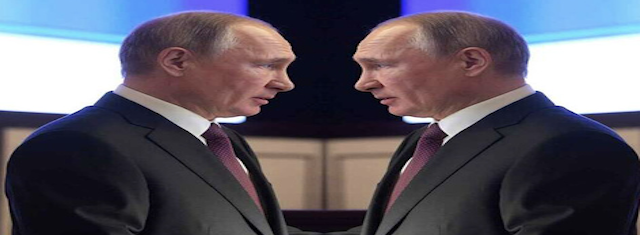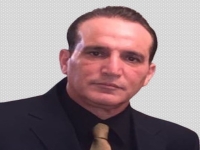Politics
What Form of Conspiracies and Secret Agreements is Putin Implementing
Research into the vision of the Russian

Vladimir Putin
USPA NEWS -
Translation by: Dr. May Alshaikhli
This article seeks, after careful review and research into the vision of the Russian political decision-maker, to consider the political attitude of President Vladimir Putin. Is it revolutionary thought and attitude to try to draw a new map of the international system by re-establishing the bipolar or multipolar system? Or is it only an apparent revolution and works to implement all the plans drawn for it to implement a unipolar system and the continuation of American leadership over the international political system?
Here, an issue that preoccupied public opinion is raised. Whom does Putin serve? Who should rule the world? By adding a historical, ideological, or philosophical dimension to the question, what kind of plots and secret agreements is Putin implementing? What is this form in the event that it is true that Putin is an agent of vital international powers?
This article seeks, after careful review and research into the vision of the Russian political decision-maker, to consider the political attitude of President Vladimir Putin. Is it revolutionary thought and attitude to try to draw a new map of the international system by re-establishing the bipolar or multipolar system? Or is it only an apparent revolution and works to implement all the plans drawn for it to implement a unipolar system and the continuation of American leadership over the international political system?
Here, an issue that preoccupied public opinion is raised. Whom does Putin serve? Who should rule the world? By adding a historical, ideological, or philosophical dimension to the question, what kind of plots and secret agreements is Putin implementing? What is this form in the event that it is true that Putin is an agent of vital international powers?
This is how Putin appears to the world as an international actor influencing the international political system, through relative compatibility with the international system without definitive contradiction. With opinion that Putin is a veteran intelligence mind who served in East Germany and had an academic position and possesses the keys to the secrets of ruling a deep state to the level of programming on management with an iron fist.
The question of Putin's strength or his revolution requires us to determine how Putin's policies were and still are internationally, regionally, and in the Arab world, according to the following:
1. Are they the policies that constitute a future vision for changing the international system in its current form?
2. Are the policies capable of sharing with the United States of America the international political system and announcing the establishment of a new world order?
3. Are the policies consistent with the demands of the international community and their future aspirations?
4. And if this is Putin's identity, is he consistent in his policy, or will he turn into a superpower that dominates parts of the world that are no different from the control of the United States of America?
1. Are they the policies that constitute a future vision for changing the international system in its current form?
2. Are the policies capable of sharing with the United States of America the international political system and announcing the establishment of a new world order?
3. Are the policies consistent with the demands of the international community and their future aspirations?
4. And if this is Putin's identity, is he consistent in his policy, or will he turn into a superpower that dominates parts of the world that are no different from the control of the United States of America?
But the facts say otherwise, in the sense that Putin works according to a specific agenda to put pressure on the European Union and subject the West to American monopoly, destroy Russia and crush it economically while curtailing its nuclear power, in addition to implementing projects and plans targeting the Arab world:
First: Russian military intervention in the Syrian civil war.
Second: The Russian invasion of Ukraine.
Third: The failure of the Nord Stream 2 project
First: Russian military intervention in the Syrian civil war.
Second: The Russian invasion of Ukraine.
Third: The failure of the Nord Stream 2 project
After huge amounts of money were paid to establish the Russian gas pipeline (Nord Stream 2) and after Germany granted Nord Stream 2 a permit to build and operate in German waters and land areas near the city of Lubmin in May 2018, when the Russian invasion of Ukraine began in February 2022, Germany froze the process of approving the opening of the line, and then the company filed for bankruptcy as a result of US sanctions imposed on Russian state-owned companies and expelled all its employees. Hence, this line has become the core of the confrontation between Russia and Western countries about Ukraine. But what raises questions about who is the winner and who is the loser in the event that the project is stopped permanently?
It is worth noting that Nord Stream 2 is a pipeline in the Baltic Sea, and it was announced as a project for the first time in 2015, which raised European and American concerns about what this pipeline constitutes as a major geopolitical weapon controlled by the Kremlin, and in a way that enhances Russia's influence on the European continent, but as mentioned above, the United States of America has devastated the project.
It is worth noting that Nord Stream 2 is a pipeline in the Baltic Sea, and it was announced as a project for the first time in 2015, which raised European and American concerns about what this pipeline constitutes as a major geopolitical weapon controlled by the Kremlin, and in a way that enhances Russia's influence on the European continent, but as mentioned above, the United States of America has devastated the project.
Fourth: Wagner Militia:
It is a Russian paramilitary organization, described by some as a private military company that has been involved in various conflicts, including the Syrian Civil War on the side of the Syrian government, as well as in the 2014-2015 war in the Donbas in Ukraine to aid the separatist forces of the self-declared Donetsk and Luhansk People's Republics. In addition, international security reports confirm that Wagner forces have established two Russian military bases in Benghazi and Tobruk, eastern Libya, to support Field Marshal Khalifa Haftar, who leads the Libyan National Army. At the same time, the Wagner militia is present in Mali and the Central African Republic, where Wagner fighters help governments fight Islamic militants and rebel forces, according to statements by the Russian Foreign Ministry. Despite all that has been said about these forces and the extent of their connection to the Russian government, and specifically the Russian intelligence, these forces had recently rebelled against President Putin in a very miserable play that ended before it began.
It is a Russian paramilitary organization, described by some as a private military company that has been involved in various conflicts, including the Syrian Civil War on the side of the Syrian government, as well as in the 2014-2015 war in the Donbas in Ukraine to aid the separatist forces of the self-declared Donetsk and Luhansk People's Republics. In addition, international security reports confirm that Wagner forces have established two Russian military bases in Benghazi and Tobruk, eastern Libya, to support Field Marshal Khalifa Haftar, who leads the Libyan National Army. At the same time, the Wagner militia is present in Mali and the Central African Republic, where Wagner fighters help governments fight Islamic militants and rebel forces, according to statements by the Russian Foreign Ministry. Despite all that has been said about these forces and the extent of their connection to the Russian government, and specifically the Russian intelligence, these forces had recently rebelled against President Putin in a very miserable play that ended before it began.
Undoubtedly, the struggle between communism and imperialism was an ideological struggle between a socialist system and a capitalist system, and the countries revolved around them according to the nature of their systems, as imposed by interests and what emerged from global politics after the end of World War II, or what was ensuing as a result of the cold war between the two poles and the changes that occurred due to the liberation revolutions, then after the collapse of the Soviet Union and what resulted in the disintegration of the countries under its umbrella and some of them joining the European Union. Perhaps Mr. Putin has lost his steps and the stage in which he strived to achieve his goal, for Russia to return to a superpower on the model of the Soviet Union, especially since Putin is very keen on extrapolating history and drawing from historical examples that enable him to control the laws of power, specifically from (Stalin) those immortal laws in the former Soviet Union, related to dictatorship and world domination.
Here, we must acknowledge that there is a huge difference between them, as no one expected that the Soviet people would rally behind their leadership with such force after the Battle of (Stalingrad), which began in 1942 and lasted 6 months. Some even expected Ukrainians and other non-Russian peoples to join the ranks of the Nazi invaders, but Soviet morale was an important factor in turning the balance of power upside down. This represents the element (perception), which is considered an element of the state's strength. As for Putin, he believes that increasing military spending is the best way to increase the power of the state, while the rest of the Soviet leaders care about the overall military balance, which they define as (the connection of high powers), as this link includes many elements such as ideology and other elements.
It is worth noting that Vladimir Putin is not the secretary of the Communist Party, and that he is the president of the Russian Federation, so the matter is different from the Soviet Union in the dialectical balance equation if we try to explain the conflict with an approach closer to the physics of politics than history. In other words, Putin does not deserve the crown studded with the hieroglyphs of the Bolshevik revolution, which expresses the dictatorship of the proletariat in the Marxist-Leninist doctrine.
Dr. Anmar Nizar Al-Droubi
Political thought researcher
Dr. Anmar Nizar Al-Droubi
Political thought researcher
Liability for this article lies with the author, who also holds the copyright. Editorial content from USPA may be quoted on other websites as long as the quote comprises no more than 5% of the entire text, is marked as such and the source is named (via hyperlink).






